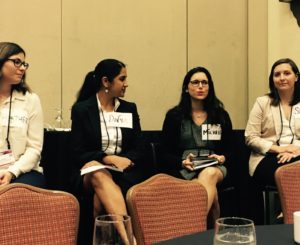Erb Students Michelle Gross and Miriam Fuchs Present in GreenBiz 16’s Panel: Tomorrow’s Thought Leaders: Understanding Millennial Priorities & Aspirations
It’s not every day that we are given the opportunity to attend the annual GreenBiz forum to learn and network with sustainability and industry executives who are among many of the nation’s and world’s key sustainability thought leaders. We felt humbled to be invited to speak on a panel during such an important event, and share our thoughts and aspirations in an open forum. While at the GreenBiz forum on February 23-25, 2016, we discussed what we hope to see from business in the next five years on the panel, Tomorrow’s Thought Leaders: Understanding Millennial Priorities & Aspirations, organized by Context, a sustainability consulting firm based in London.

Miriam Fuchs (left) is a 2016 MBA/MS Erb Institute alumnus
Miriam Fuchs took a five pillar approach in what she would like to see in companies in order to positively deviate from the status quo. Areas she would like companies to address include:
- Sustainability education and training across a company to all employees to allow interdisciplinary thinking in individual tasks and larger decision making,
- Goals beyond traditional metrics, such as sustainability or creativity oriented goals rather than simply profit,
- Communication and collaboration across departments to learn from and build upon other departments’ successes,
- Cross-company and cross-industry collaboration to foster best practices and innovation in the best interest of the planet’s future, and
- Fostering creativity and innovation by providing additional time for employees to work in new functions or to pursue an original idea.
These changes will embed sustainability into the backbone of an organization and open companies up to new possibilities not imaginable today. The new additions to business will lead to a constantly open dialogue of potential sustainability improvements across employees, competitors and value chains; and each of these individual entities will have the education and drive of a sustainability-oriented mindset in tasks and decisions making from product design to supply chains to communication with the consumer.

Michelle Gross (second from right) is a 2017 MBA/MS Erb Institute alumnus
Michelle Gross discussed how transparency should be a vehicle for creating change across industry while respecting stakeholders and minimizing greenwashing. She discussed the challenges that transparency can pose to companies including shying away from seemingly unattainable goals, diversion of core competency focus, fear of unusual ways of doing business, and inexperience about how to define or choose metrics. For example, sustainability reporting and goals could also expose companies to more criticism by stakeholders, if they are perceived as being deceptive in their ‘environmentally friendly’ reporting. She offered a solution that companies enter partnerships or alliances across their industries or with public institutions to develop best practices in reporting on positive and negative impact on the environment and society. Ultimately, transparency should be framed as an opportunity for companies to be genuine, humane, and progressive so they can communicate their message effectively, and stay true to their corporate values. When Patagonia was cited as an example of this, the question was raised – Why does Patagonia always come up as being the ‘best?’ – Perhaps it is their transparency and readiness to take a financial hit with their switch to sourcing of organic cotton, or maybe it is because they have been successful at communicating their mission and brand from the very beginning. In any case, Patagonia should serve as an example for retailers to show the opportunity that exists for a retailer to be transparent and also transform their industry.
While reflecting on our time at the conference, we found it interesting to hear the variety of opinions and also overlapping perspectives from the other panelists. The views presented inspired interesting questions from the audience about balancing transparency in the face of criticism, and especially in the age of social media. This common challenge exists for corporations wanting to balance promotion of the positive impact a brand can have while not being in the spotlight when ‘things go wrong.’ However, anyone who may read the newspaper will understand that it is impossible to control PR, for corporations, celebrities, or anyone in the spotlight. This makes it evermore important that corporations know what is happening throughout their company and across their supply chains. Unfortunately and fortunately, depending on your perspective, the open global world we live in today brings complexity that did not exist previously, and makes doing business that much more challenging – and interesting – for the millennial generation.